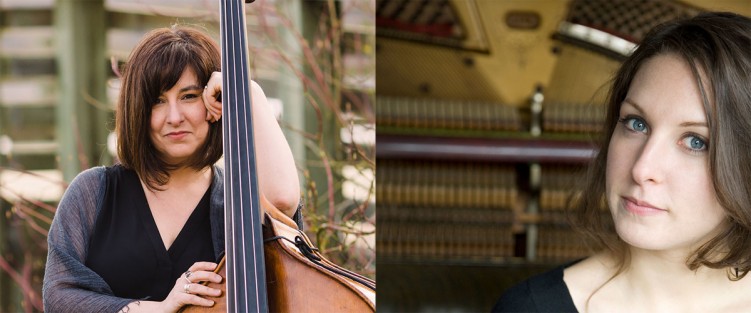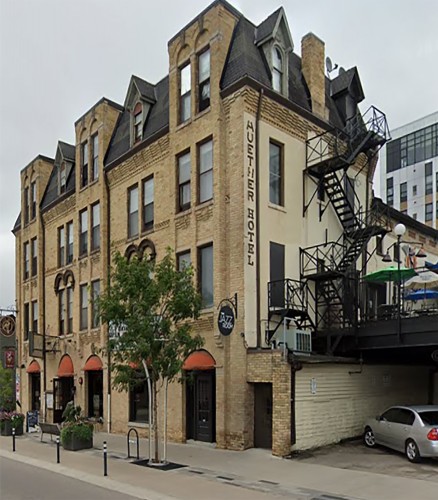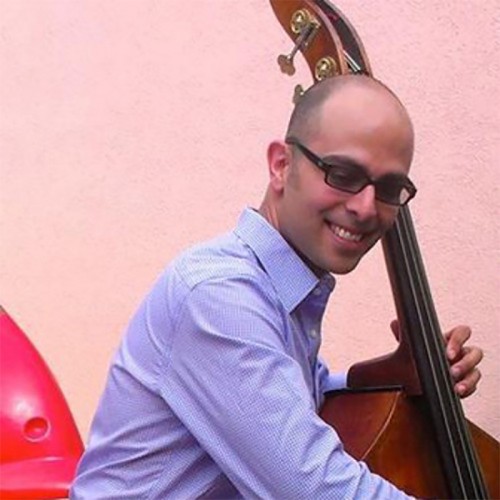 When I was first contemplating applying to the University of Toronto’s Jazz Studies program, there were many factors that made the prospect appealing: the downtown location, the stellar faculty, the impressive (and at times intimidating) skill level of the student body. Nothing, however, quite captured the allure of the program as much as the promise of the weekly small-ensemble performances at The Rex.
When I was first contemplating applying to the University of Toronto’s Jazz Studies program, there were many factors that made the prospect appealing: the downtown location, the stellar faculty, the impressive (and at times intimidating) skill level of the student body. Nothing, however, quite captured the allure of the program as much as the promise of the weekly small-ensemble performances at The Rex.
In (probably) every postsecondary performance program, classical, jazz or otherwise, small and large ensembles are set up as courses, with weekly rehearsals, a faculty leader, and graded performances. At U of T, these performances happen both on campus and at The Rex.
 The experience of playing in an actual jazz club – especially, for someone who grew up in a west-coast suburb – was thrilling and validating. It is also a wonderful community experience for students, the performances functioning as regular de facto social events, at which you can listen to your peers, have a drink, and feel part of something real. For audience members – including, invariably, friends and family of the performers – it’s an opportunity to hear new musicians and interesting original music, and to support the next generation of musical performers. (From experience, it can also be somewhat anxiety-inducing: there’s nothing quite so destabilizing as being mid-song and suddenly wondering what grade you might get.) www.therex.ca
The experience of playing in an actual jazz club – especially, for someone who grew up in a west-coast suburb – was thrilling and validating. It is also a wonderful community experience for students, the performances functioning as regular de facto social events, at which you can listen to your peers, have a drink, and feel part of something real. For audience members – including, invariably, friends and family of the performers – it’s an opportunity to hear new musicians and interesting original music, and to support the next generation of musical performers. (From experience, it can also be somewhat anxiety-inducing: there’s nothing quite so destabilizing as being mid-song and suddenly wondering what grade you might get.) www.therex.ca
U of T small ensemble performances happen at The Rex on Monday nights, from 5:30pm to 7:30pm, starting in September and running throughout the school year. To mark their return, I had a chance to chat with the JUNO-award-winning bassist Jon Maharaj, U of T faculty member and ensemble coach.
CS: What has the experience of leading a small ensemble been like for you?
JM: At U of T, there has been a shortage of bass players, so not only have I gotten to lead ensembles, but thus far I have been leading from the bass chair. By being in the thick of it with students I get a greater sense of not only how they sound out front, but what it feels like to play with them. This allows me to get a clearer sense of how they function in a band setting, and it also gives me the opportunity to lead more by example than by comments. I have a very high standard for all my students, and this past year my U of T ensemble really rose to the occasion in a way that I had not previously seen.
How did your own experiences playing in ensembles in undergrad affect your approach to leading ensembles as a faculty member?
One thing I experienced as a student from some ensemble leaders that I didn’t want to perpetuate was the approach of bringing in a chart with no aural reference and having the students bash through it, whether they actually liked the music or not. The longer I play and teach the more I realize that there are many non-genre specific truths to music (time, tone, phrasing) that, as a student who could already play somewhat convincingly over chord changes at a young age, I glazed over. I would rather spend two hours (or months) working through a very “basic” tune with students (in various keys, feels and tempos) until they can really start to hear their way through it, rather than presenting them with something that poses more of an intellectual challenge based on theoretical concepts that may not have many applications outside of the specific piece.
In your observations, how are off-campus performances different from on-campus performances?
In my experience, public performance outside of the school is incredibly valuable for all students. In music school we can often find ourselves in a bubble that is not necessarily representative of reality. I think it’s crucial to play in places outside of the institution, for people who are not music students or professors.
How do you think that the educational experience of ensembles could be made better?
I think the educational aspects of ensemble could be improved upon by emphasizing a more aural approach to learning music. That could mean insisting on no charts on stage, or just learning all the music by ear in the first place. While I admit there is a learning curve with doing things this way and it involves a lot of patience on the front end, it is my experience that having a strong aural foundation will serve musicians on any gig they find themselves on in the future regardless of genre.
Outside of Toronto, other performance series are also making a return this September. The Jazz Room in Waterloo opens its 14th season this year with a number of excellent shows, starting with tenor saxophonist Dave Wiffen on September 6, appearing with trumpeter Paul Mitchell, guitarist Dave Thompson, bassist Matt Lima, and drummer Jimmy Boudreau. The night after, on September 7, the Nimmons Tribute takes the stage. The band, as the name suggests, performs the music of late Canadian jazz musician Phil Nimmons, led by Nimmons’ grandson, pianist Sean Nimmons-Paterson, joined by trumpeter Kevin Turcotte, alto saxophonist Tara Davidson, tenor saxophonists Mike Murley and Alex Dean, trombonist Will Carn, drummer Ethan Ardelli, and bassist Jon Marahaj.
Later in the month, on September 13, the Ostara Project – co-led by Vancouver-based bassist Jodi Proznick and Vancouver-expat pianist Amanda Tosoff – plays the Jazz Room, with a fantastic band that includes Proznick, Tosoff, trumpeter Rachel Therrien, alto saxophonist Allison Au, vocalist Kim Zombik, and drummer Valérie Lacombe. www.kwjazzroom.com
Personal note: Though I am far removed from my undergraduate days, I am also playing at The Rex this month. On September 1 and 2, I’ll be there at 8:30pm with my own project, featuring keyboardist Ewen Farncombe, bassist Kurt Nielsen and drummer Jon Catanus, playing my original compositions. Come down, enjoy some tunes and welcome the start of September with us. Just, please, don’t try to give us a grade.
JAZZ PLUS, QUICK PICKS
“Mainly, mostly”
Frequenters of this niche know that though jazz and clubs are primary focuses, “mainly” and “mostly” are the modifiers we use to hedge our bets. First two events here are a case in point.
Now in its tenth year, the Toronto Undergraduate Jazz Festival (TUJF) takes place outdoors at Mel Lastman Square in North York, over the Labour Day holiday weekend, commencing 6pm, Friday August 30, and wrapping up Monday September 2 at 8pm. Between those times, TUJF will offer up 24 shows, spread over two stages: two on Friday, eight each on Saturday and Sunday, and six on Monday.
There are a few headliners, but if, scrolling their informative website you run into more names you don’t know than you do, well, that’s the point. The festival is now under the auspices of nonprofit Emerging Artists Association (EAA) whose mission is to be “a platform for dreamers,” creating opportunities for equity-deserving artists and “facilitating the experience of Jazz in the Now (the jazz music of today). Check it out at tujazz.com/tujazzfest2024.
And over in Brampton, on September 21, co-curators, and consummate musicians, Larnell Lewis and Joy Lapps offer up their third annual FLOW FEST, Brampton’s International Drumming Festival, on the Rose Theatre mainstage and throughout its surrounds: everything from DJs and roaming musical ensembles to visual art and food. “Be immersed in a percussive party celebrating culture, music, and drums from around the world as you dance and play the night away” the Brampton Onstage website says. With its fusion of jazz, Afro-Caribbean and world beats, it should be, once again, a night to remember. https://tickets.brampton.ca
Soft seat beat is our affectionate short-hand name for concert-style venues where the music doesn’t compete with the clinks of china and glass and there are three or four such events this issue worth noting:
Alliance Française de Toronto, on Spadina Rd, has two of them. Sep 14, at 8pm, The Ostara Project is Kim Zombik, singer; Jodi Proznick, bass; Amanda Tosoff, piano; Allison Au, saxophone; Rachel Therrien, trumpet; and Valérie Lacombe, drums (with complimentary drinks outside the auditorium at 6:30pm to celebrate the launch of the AFT 2024-2025 cultural season.)
And Sep 27, at 8pm, it’s the Amir Amiri Ensemble offering Persian music on oud, percussion, viola, santur and ghaychak.
Over at Heliconian Hall, Sep 25 and 26, Confluence Concerts offers American Icons: Strayhorn, Ellington, and Williams, curated by bassist Andrew Downing, with a pre-concert chat at 6:45pm. A celebration of three jazz greats: Billy Strayhorn, his mentor Duke Ellington, and his contemporary Mary Lou Williams. And at Burdock Music Hall, 7pm on Sep 21, The Terry Cade Quartet offers up original jazz compositions with Terry Cade, vocalist; Tom Reynolds, piano; George Koller, bass; and Lorne Nehring, drums.
As for the clubs … we’ve done some significant tweaking to our club directory (see p.34): more than 40 venues, and instagram as well as website links, so you can be as up-to-date with the info as the clubs themselves! Check it out.
Colin Story is a jazz guitarist, writer and teacher based in Toronto. He can be reached at www.colinstory.com, and on Instagram and X (formerly Twitter).




